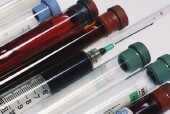A Better Blood Test for Heart Risk?
Tracking 2 proteins might be more precise than cholesterol readings, experts say.
By Ed Edelson
HealthDay Reporter
|
E-mail this article
Subscribe to news
Printer friendly version
|

(SOURCES: Matthew McQueen, M.D., professor, pathology and molecular medicine, McMaster University, Hamilton, Ontario, Canada; Lars Lind, M.D., professor, medicine, University of Uppsala, Sweden; Peter Wilson, M.D., professor of medicine, Emory University, Atlanta; July 18, 2008, Lancet)
THURSDAY, July 17 (HealthDay News) -- Measuring proteins that carry cholesterol in the blood may give a better estimate of heart attack risk than measuring cholesterol, a major study finds.
The study focused on the ratio of two of the proteins, called apolipoprotein B100 (ApoB) and apolipoprotein A1 (ApoA1). The international team of researchers studied data on more than 27,000 people and found that the ratio of apolipoprotein B100 (ApoB) to apolipoprotein A1 (ApoA1) accounted for 54 percent of the risk of heart attack.
In contrast, the standard ratio of "bad" LDL cholesterol to "good" HDL cholesterol accounted for only 37 percent of the risk, researchers reported in the July 19 issue of The Lancet.
But the two testing methods are finely connected, said study lead researcher Dr. Matthew McQueen, professor of pathology and molecular medicine at McMaster University in Hamilton, Ontario, Canada.
"When you start looking at cholesterol and apolipoproteins, they are very closely related," McQueen said. "The protein that carries LDL cholesterol is ApoB, and the protein that carries HDL cholesterol is ApoA1. Clearly, you're not going to find differences [in a study] unless you do large numbers."
The finding directly contradicted a report last year from the renowned Framingham Heart Study, which found that measuring ApoB/ApoA1 ratios added nothing to standard risk assessments from ordinary blood cholesterol tests. The Framingham study -- which included about 3,300 middle-aged men, 291 of whom developed heart disease over 15 years -- was numerically much smaller than the new report, however.
"It's a question of statistical power in a study," agreed Dr. Lars Lind, professor of medicine at the University of Uppsala in Sweden, who wrote an accompanying editorial on the new findings in The Lancet. "This study is based on more than 10,000 cases. When it come to statistics, it is the number of cases that really counts," he said.
The fact that the study was done "not only in a large number of people but also in 52 countries and a variety of ethnic groups" also adds strength to the findings, McQueen said.
But that very variety could also be a weakness, said Dr. Peter Wilson, who took part in the Framingham study while at Boston University. He is now professor of medicine at Emory University in Atlanta. "It's not like they had a single community or controls from lots of different types all around the world," he reasoned.
Another weakness of the study was that it included people only after they had heart attacks, Wilson said. That means that "you can't talk about lipid [blood fats] risk before you get a heart attack," he said. "This is lipid risk only after you have a heart attack."
Finally, the study was conducted with frozen blood specimens, Wilson noted. "Cholesterol does better in fresh specimens," he said.
Despite those flaws, the new findings do add to indications that apolipoprotein testing has a major clinical role to play in the future, Wilson said. The American College of Cardiology has recently discussed such testing for people with diabetes, he said.
Even if such tests are better than the existing cholesterol tests, it will take time to introduce them into general medical practice, Wilson said. "The point is technology," he said. "Cholesterol tests are all reliable, and we know what they mean. We don't have experience with apolipoproteins in the clinical environment."
Automated apolipoprotein tests now are available, McQueen said. He said he uses them to add information to what is shown by conventional cholesterol testing.
The Uppsala hospital is trying to phase in apolipoprotein tests, Lind said. "We are giving them in tandem, so that people get adjusted to them," he said.
More information
Find out the basics on cholesterol at the American Heart Association. 
Copyright © 2008 ScoutNews, LLC. All rights reserved. 
HealthDayNews articles are derived from various sources and do not reflect federal policy. healthfinder.gov does not endorse opinions, products, or services that may appear in news stories. For more information on health topics in the news, visit the healthfinder.gov health library.